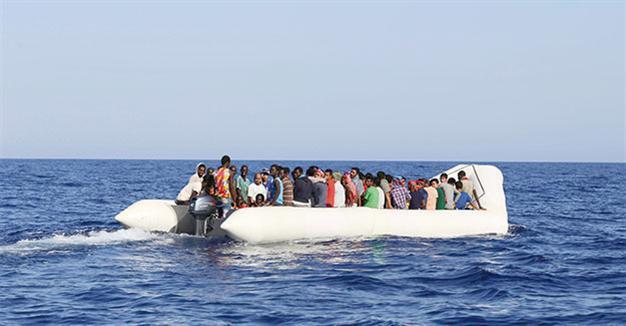Aegean smugglers use new rhetoric to trick migrants into making perilous journey to Greece
Banu Şen – İZMİR

A picture taken on September 14, 2016 shows migrants aboard a dengue boat during a rescue operation run by the Malta-based NGO Migrant Offshore Aid Station (MOAS), at the offshore of the western Libyan town of Sabratha. AFP photo
Human smugglers have started to use new rhetoric in order to trick migrants in Turkey into making the perilous journey to Greek islands with the hope of a better life, while also lowering the prices of the journeys on mostly unsafe dinghies.
Taking advantage of the row between Turkey and the European Union over the implementation of visa-free travel for Turkish citizens, human smugglers in Turkey’s Aegean coasts have developed new rhetoric by telling migrants the EU-Turkey migrant deal would soon fall apart and thus they should cross the Aegean Sea.
Turkey and the EU reached a deal in mid-March, when Turkey agreed to take back all irregular migrants reaching Greece in exchange for the EU taking the same amount of Syrian refugees from Turkish refugee camps. Within the deal, the EU also agreed to give a total of 6 billion euros to Turkey to be used for Syrian refugees, accelerated EU accession talks for Turkey and visa liberalization for Turkish citizens on the grounds the country met all 72 criteria.
The row started when the EU insisted that Turkey change its anti-terror law – one of the 72 criteria – to which Turkey has objected severely.
Police sources speaking on condition of anonymity in the Aegean city of İzmir said that the price for a journey on a boat from Turkey to a Greek island had fallen as low as $250, while this figure was between $1,000 and $1,500 at around the same time last year.
More than 1 million migrants entered the EU in 2015, most of them from Turkey.
This new rhetoric and sales on the tariffs have affected the number of crossings made from Turkey to the Greek islands.
Greek authorities said a total of 960 migrants entered the country from three islands – Lesvos, Chios and Samos – between Sept. 1 and the morning of Sept. 12, while the UNHCR put this figure at 1,458.
Though the number of migrants crossing from Turkey to Greece decreased significantly after the migrant deal in March, the figures started to increase again over the last month.
While this figure was 1,721 in May, 1,554 in June and 1,920 in July, it rose to 3,447 in August and Greek authorities said the overall figure in September could exceed that total if the trend continued as it had over the first 12 days of the month.
The Turkish Coast Guard said the number of migrants caught before they could make the journey to Greece had also increased lately.
This figure was 1,109 in May, 538 in June and 881 in July but increased to 1,604 in August, while 948 migrants were caught in the first nine days of September.
235,000 migrants ready to head to Italy, says UN
While there was a rise in migrant crossings in the Aegean Sea, the situation was no different in the Mediterranean Sea, despite the journey from Libya to Italy being more dangerous.
United Nations envoy Martin Kobler said in an interview published on Sept. 15 that some 235,000 migrants in Libya were ready to make the dangerous Mediterranean crossing to Italy as soon as the opportunity arose. As Kobler was making this statement, reports emerged that the bodies of five migrants were being recovered off the Libyan coast.
“We have on our lists 235,000 migrants who are just waiting for a good opportunity to depart for Italy, and they will do it,” Kobler told Italian daily La Stampa.
“Reinforcing security is the most important issue at the moment. If we have a strong and unified army... then the dangers of terrorism and human trafficking will cease,” he added.
According to the Italian Interior Ministry, nearly 128,400 migrants have arrived via the Mediterranean since the start of the year - a five percent jump over the same period in 2015.
The Italian coast guard said on Sept. 14 that the bodies of five migrants were recovered while 650 others had been rescued during the day in several operations.
The rescued migrants were pulled from five inflatable boats and one small vessel, said a coast guard statement, giving details of six separate operations.
An Italian navy vessel and a Maltese non-governmental group’s boat were involved, along with Irish navy patrol boat the James Joyce, which recovered the five bodies, the statement said.
